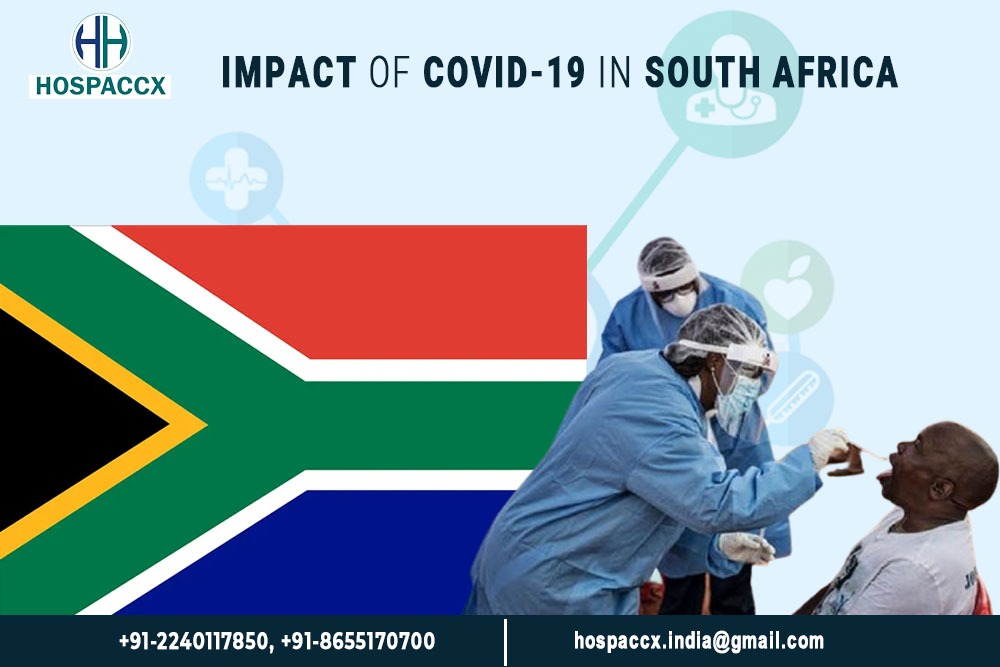IMPACT OF COVID-19 IN SOUTH AFRICA
Every continent has seen COVID-19’s fast global proliferation. Despite being one of the last continents to be infected, Africa had over 34,000 confirmed cases at the start of April. South Africa had one of the highest case occurrences on the continent. The number of confirmed cases had increased to more than 3000 cases as of April 22, 2020, with 65 fatalities. As of June 2022, the WHO had recorded more than 39 lakh confirmed cases and one lakh fatalities.
IMPACT OF COVID – 19 IN HEALTHCARE
Unquestionably, the pandemic had a devastating impact on the healthcare industry. The availability and demand of other crucial healthcare services were disrupted by pandemics and disease outbreaks, which harmed patient health, particularly for high-risk clinical treatments such as acute response and prenatal care.
Both industrialized and poor countries are struggling to cope with the COVID-19 epidemic. Although Africa has one of the world’s weakest health systems, little is known about how the continent planned for, dealt with, and responded to the epidemic. Routine health services were less accessible as a result of the COVID-19 pandemic’s reactions, which included varying degrees of lockdowns, restrictions on health services, a lack of staff due to COVID-19 infection and fear.
The government also used the lockdown time to get the healthcare system ready for the COVID-19 reaction. Ventilators and personal protective equipment were ordered. The first day of April 2020 saw the installation of 67 mobile test units and the deployment of 10,000 volunteers to conduct neighbourhood screenings. Public and private hospitals negotiated to allow patients to use available Critical Care and Intensive Care Unit beds in private hospitals if necessary. Field hospitals were designed to complement public hospital capacity. By the end of 2020, an approximately equal percentage of COVID-19 tests had been employed in the commercial and public healthcare systems in South Africa, which is heavily dependent on the public healthcare system due to the country’s lack of insurance.
Pharmaceutical sector
The pharmaceutical sector is essential to the delivery of high-quality healthcare services, particularly during pandemics when the supply chain for medications may become overburdened or shut down for a variety of causes. The COVID-19 epidemic made country’s unequal access to necessary medications in both the public and private sectors.
The likelihood of pandemics rose with growing globalisation and population movement. The pharmaceutical industry has not been an exception under these circumstances, restricting access to high-quality, cost-effective medications to manage illnesses in an area with a high burden of infectious diseases and underdeveloped healthcare infrastructure.
Additionally, pharmaceutical supplies were hoarded and not released to buying nations, which resulted in shortages or disruptions to the supply chains in the country. Lockdowns that occurred in the early stages of the COVID-19 pandemic resulted in restrictions on internal and external movement, which had a significant influence on the delivery and transportation of pharmaceutical supplies during that time. The pandemic severely damaged South Africa’s pharmaceutical systems, reducing availability to necessary medications.
Medical tourism
According to the Medical Tourism Index 2020–21, South Africa is ranked as one of the top 22 places in Africa. Covid-19, however, has impeded medical tourism worldwide as well as in South Africa.
The expansion of medical tourism over the past ten years has unquestionably contributed to the sector’s overall growth. The country’s medical tourism industries will suffer for a considerable amount of time due to the COVID-19 pandemic’s multifaceted effects, which include the healthcare crisis, the declining economy, the cessation of international travel followed by restricted international travel with associated infection risk.
Patients did not prefer South Africa as a destination for medical tourism, depending on how affected the country was. Due to the global economic crisis, many patients were unsure if they could afford the costs associated with medical travel.
Due to the effects of the pandemic, the expected development of the medical tourism business would lag significantly. All countries that cater to medical tourism, as well as all internationally recognized hospitals and health care services, must take action to ensure there is the least amount of harm and the greatest amount of recovery.
Medical Tourism will take a considerable time to recover like other industries. To ensure the trust of foreign patients, it will be crucial for the government to introduce some standardisation into the health care system specifically for medical tourism. A change in treatment fee plans is also needed, considering the decline in the global economy.
IMPACT OF COVID-19 ON ECONOMY
GOVERNANCE – Early action by the government resulted in a nationwide lockdown and a thorough public health response. Additionally, in accordance with the Calamity Management Act, the President proclaimed a state of disaster. Level 5 is the highest level, which is enforced when there is intense community transmission, and a country-wide lockdown is implemented, according to the risk-adjusted approach that the government designed.
To assist the COVID-19 reaction at the national level, the country office repurposed all technical officers in March 2020. In July 2020, when the nation ranked sixth internationally in terms of the total number of cases, the President asked WHO for technical assistance. As part of South Africa’s response to COVID-19, WHO pledged to provide technical specialists based on its extensive emergency preparedness program and local expertise. ECONOMY – The COVID-19 outbreak’s aftereffects exacerbated South Africa’s inequality and poverty. The percentage increase in the number of women living below the Lower Bound Poverty Line (LBPL) was 0.39% in the most optimistic scenario, compared to 0.24% for males. The GDP decreased by about 5% in the year 2020. To halt the spread of COVID-19, global governments had the difficult task of balancing the financial costs of lockdowns against their health benefits, particularly the restrictions they apply on low-income and food-insecure households.
COVID-19 possessed a threat to 3 million South Africans falling into poverty in the nation with the worst inequality rates in the world and where 20% of the population lived in extreme poverty (World Bank, 2020). Data from surveys indicated that historically more vulnerable groups, such as women, Black Africans, youth, and those with lower levels of education, had been disproportionately harmed. Due to the epidemic, more individuals are living below the upper and lower poverty levels.
The industries that were considered necessary, such as health, food and agriculture, finance and insurance, and telecommunications services, were the ones that succeeded. Other industries such as textiles, glass goods, footwear, education, catering and lodging, beverage, and tobacco suffered losses.
There were 1.2 lakh people who lost their jobs in 2020, which increased unemployment. However, as lockdown restrictions were relaxed and government initiatives to stimulate the economy were put into place, unemployment also decreased, but more slowly than economic growth.
The government of South Africa announced a significant social assistance and economic support package of R500 billion, or around 10% of GDP, as part of the country’s second phase of recovery.
In the current fiscal and monetary package, the minister of Finance unveiled R500 billion for assisting the weak, the ill, and the most vulnerable members of society by easing social distress and hunger as well as supporting businesses.
COVID-19 EFFECT ON SOUTH AFRICAN POPULATION
In South Africa, COVID-19 had a negative impact on mental health. After the initial lockdown in March 2020, the South African Depression & Anxiety Group (SADAG) conducted a general survey. Although the results supported the boundaries, they also revealed that lockdown caused stress for 65% of respondents. 72% of the population between 18-35 years of age were affected by the epidemic and were at risk for depression. Resources were scarce, which led to the deterioration of mental health issues.
According to a research done on university students, compared to levels of loneliness before the COVID-19 outbreak, loneliness, which was associated with a number of mental health issues like depression, suicide risk, and drug use, had increased drastically among that demographic.
While higher income professionals and managers have been able to maintain physical distancing, areas of high transmission have emerged in dense zones with workplace clusters, affecting mainly manual workers in mining, manufacturing, retail and services.
CONCLUSION
Africa’s health systems were not well prepared for the epidemic, and it had a significant impact. Response times were long and did not reflect the severity of the issue. Government should have prioritized interventions that will increase and strengthen health system financing and resilience through local, national, and international participation. Maintaining open flows of trade and investment, along with fiscal and monetary policies, could bolster prospects for a strong economic recovery from the COVID-19 pandemic.
For more information about the Country and Healthcare opportunities in South Africa, you can visit the company website on www.hospaccxconsulting.com or contact us directly.
Related Team Members










